I’ve been attending Notting Hill Carnival since the ripe age of four. I danced on my school float and once set up a stall selling Ribena, but as an adult, my Carnival ritual has centred around one thing. On this August bank holiday weekend, when two million people take to the streets of West London to celebrate British West Indian culture, food is at least half of the fun. Specifically, jerk-based food.
My Carnival day usually starts at around 10 AM, when I wake to the sound of my flat windows vibrating from the noise of the floats outside. I’ll have some breakfast, before fixing a nice morning rum and Ting-based cocktail. After clambering out of my basement flat to watch the dancers and steelbands, it’s time to venture into the writhing mass of bodies in search of jerk chicken. Surveying the line of grills (fresh coconut in one hand, Red Stripe in the other), smoke billowing over my head, I usually go for a jerk barbecue option. I’ll sit on an inevitably piss-drenched kerb to attack the polystyrene-encased meal with my bare hands.
Videos by VICE
When I became vegetarian, my jerk chicken days were over. I’ve made many attempts at creating a veggie version of the iconic Caribbean dish, like the “white girl jerk tofu” recipe I cook each year to feed the 24 friends, and friends of friends, who end up coming through the door. But of course, it never really compares to that freshly grilled, skilfully seasoned jerk chicken and pork served on the paint-covered streets of Notting Hill each August.
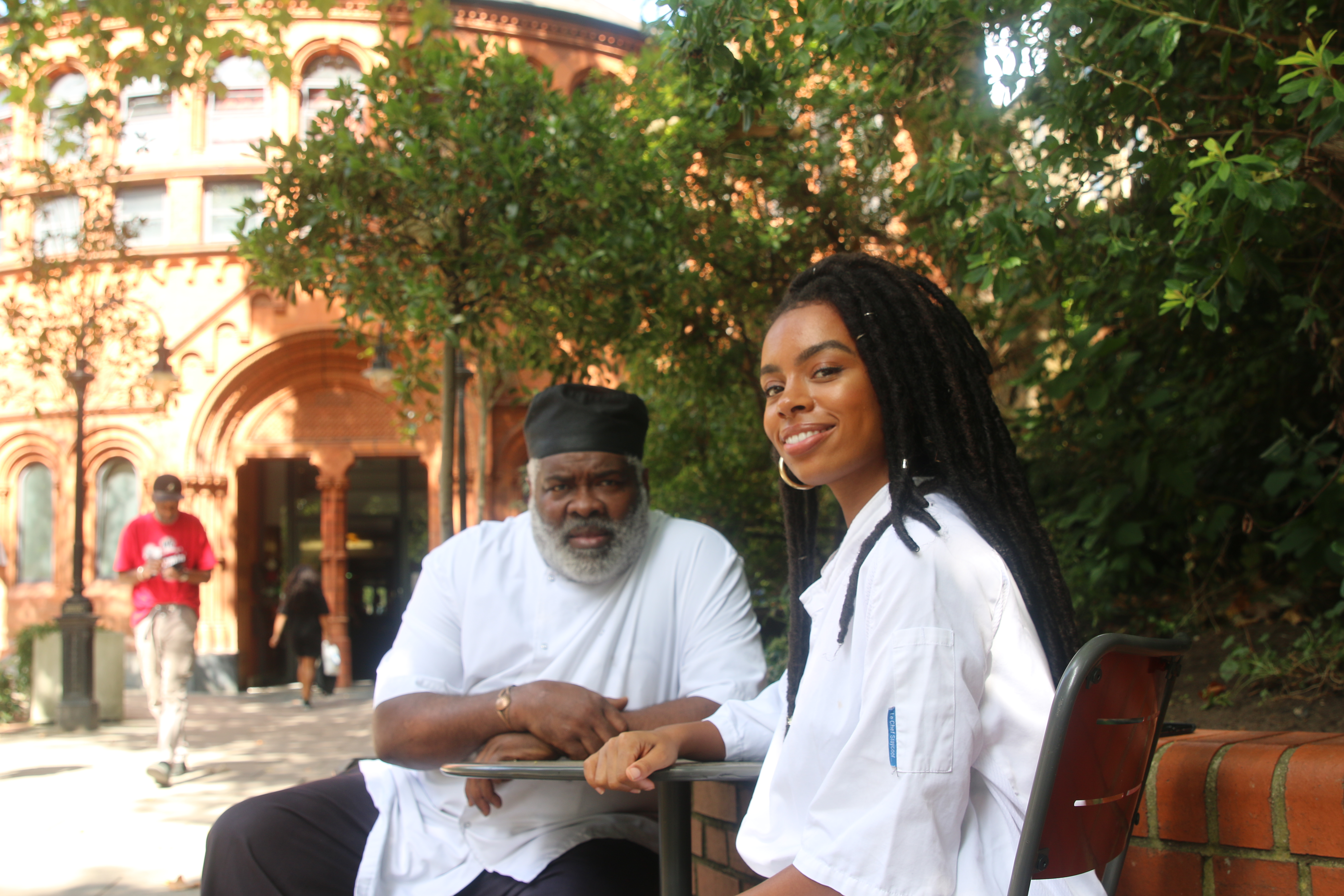
Perhaps there’s hope for me yet. It’s nearly Carnival weekend, and I’m heading down to The Tabernacle, a community centre in Notting Hill and home of the award-winning Mangrove Steelband. Here, I meet the group’s head chef Mangrove Fats and vegan YouTuber Rachel Ama, who are joining forces to create a meat-free alternative to jerk chicken.
When I arrive, it’s clear that Carnival is right around the corner. Fats has been busy preparing for the Red Bull Music x Mangrove sound system, and the streets around the community centre have a calm-before-the-storm feeling.
Ama has been coming to Carnival since childhood, but after going vegan three years ago and making a series of YouTube recipe tutorials featuring vegan versions of classic Caribbean dishes, she felt the time had come to adapt jerk chicken.

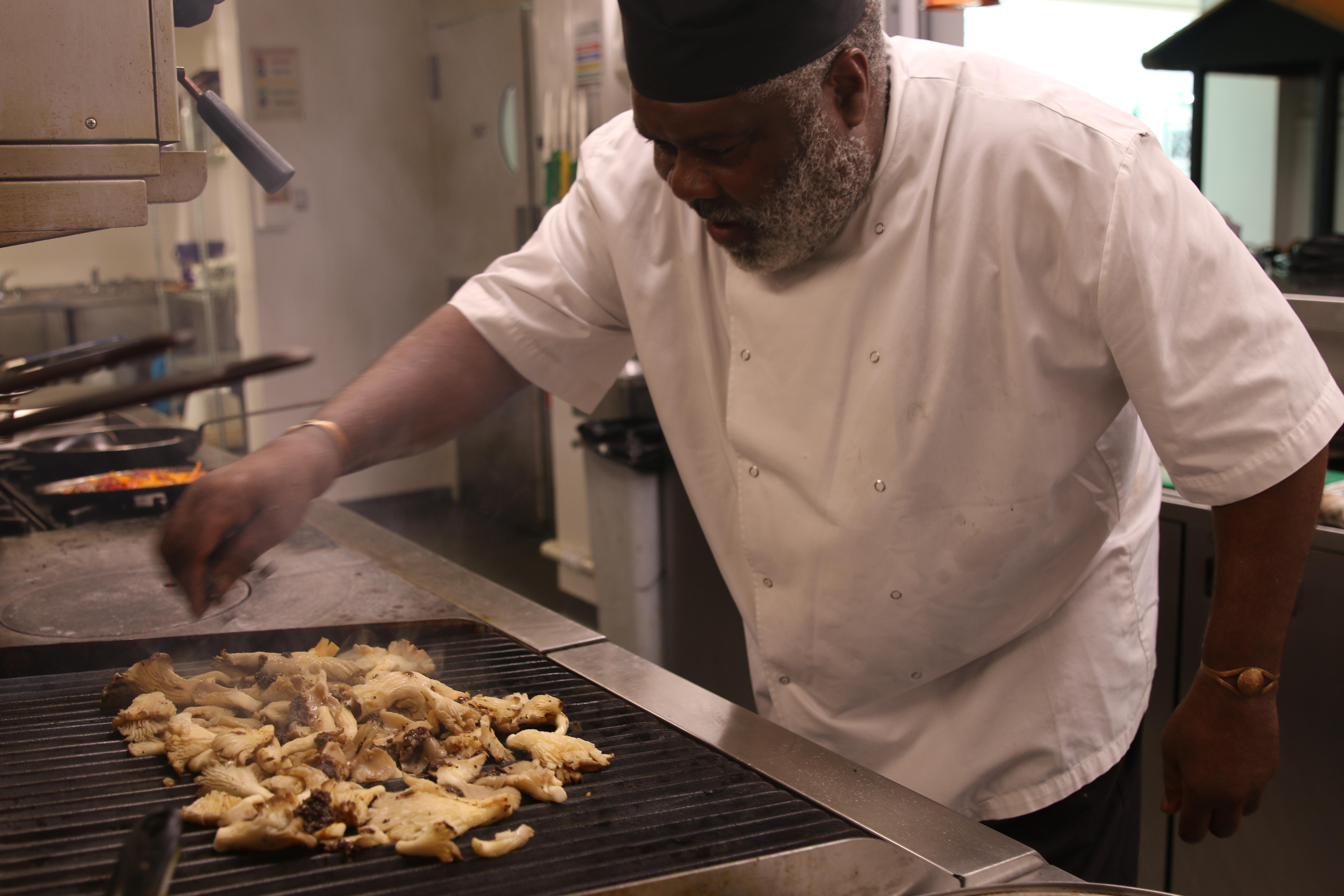
“I attempted to make a seitan version of the jerk,” she tells me as we begin setting up in The Tabernacle’s kitchen, surrounded by photographs of Carnival dancers throughout the years, “but I feel like it let the jerk sauce down, because the seitan has its own taste and texture.”
“[Seitan is] still processed food, it’s still mock meat,” Ama continues. “Whereas when you’re using a whole plant food, I feel like it absorbs the flavours better, and I feel like you get to taste the jerk seasoning better, so I wanted mushrooms.”
Fats surveys the oyster mushrooms Ama has placed on the kitchen worktop with some suspicion, and it takes a while to explain the vegan cashew sauce. Despite this, he is enthusiastic about the potential for innovation when it comes to making a plant-based jerk dish.
“Well,” he says, “it’s something new.”

First, Fats and Ama sauté onions and peppers together until soft. Next, the oyster mushrooms go on the grill and begin to look more and more like chicken. Fats pulls out a giant tub of his special jerk sauce.
“How hot is it?” Ama asks. “I’m not great at spice.”
“It’s a little hot,” says Fats, spooning it over the mushrooms.
What, in their opinion, makes a good jerk sauce?
“It has to be locally produced, like all the coriander, parsley, thyme, the garlic, the ginger, the Scotch bonnet, and the spring onion,” says Fats. “If you haven’t got a good jerk seasoning, you can’t get it right.”

Ama agrees that it’s all about the ingredients: “[It’s the] parsley, the coriander, the pimento, the Scotch bonnet, the thyme, ginger—I love ginger—and garlic.”
When jerk chicken or pork’s core identity is in the spicy, fresh flavours of its sauce or marinade, perhaps transferring this to something vegetable-based won’t be too much of a challenge.
“Once you get the flavour, that’s what matters,” agrees Fats.
“Put it this way, if I were to have a vegan restaurant, I would have to be different,” he continues. “I don’t like to copy people. I could take your idea and give it a twist, but I don’t like to follow fashion in cooking, because I’ve got a brain.”
Enthused by his idea for a fictional vegan venture, Fats finishes off the dish. Ama instructs and just before the mushrooms are served, she lets us into the secret behind another one of her favourite Caribbean recipes: vegan ackee and saltfish.
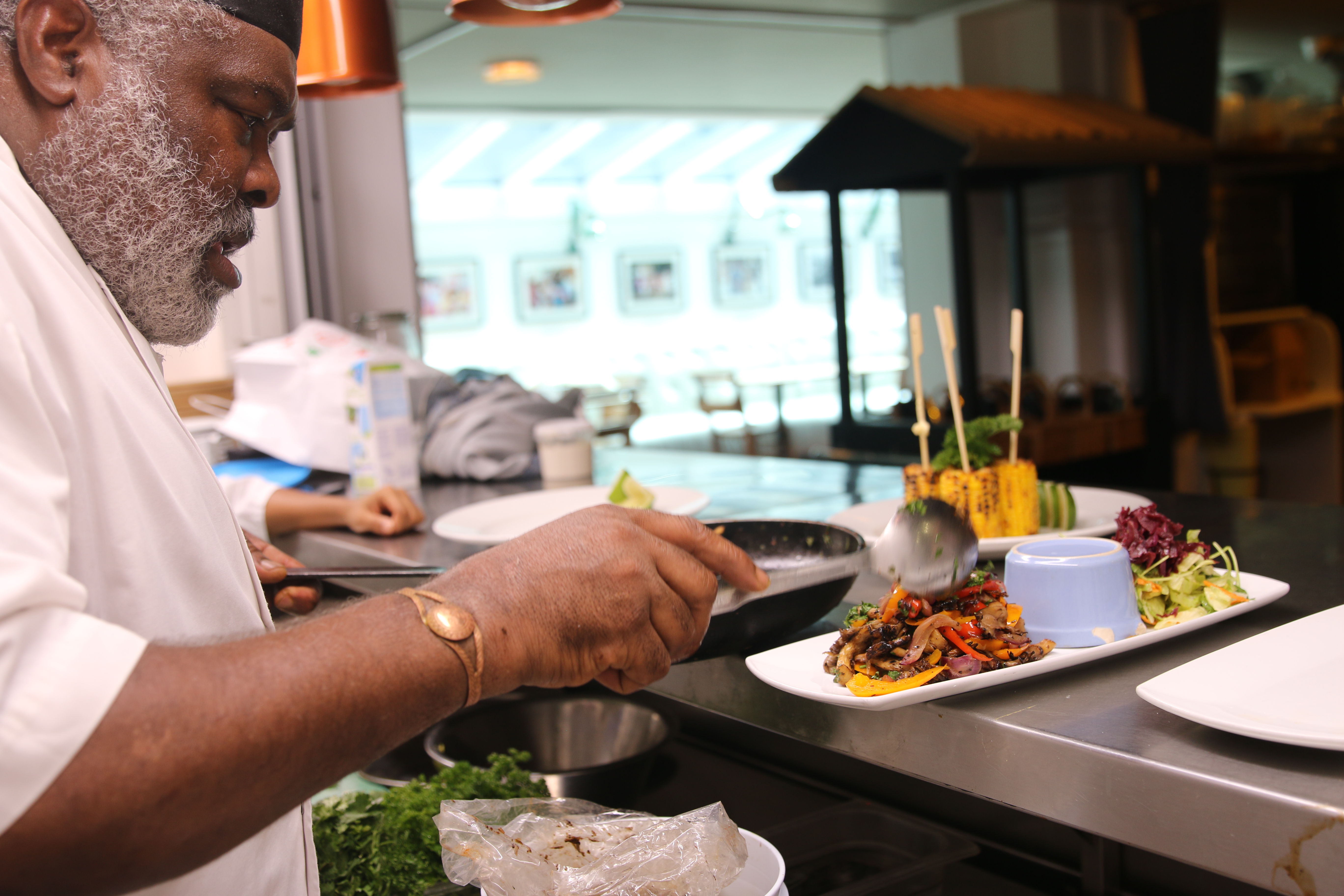
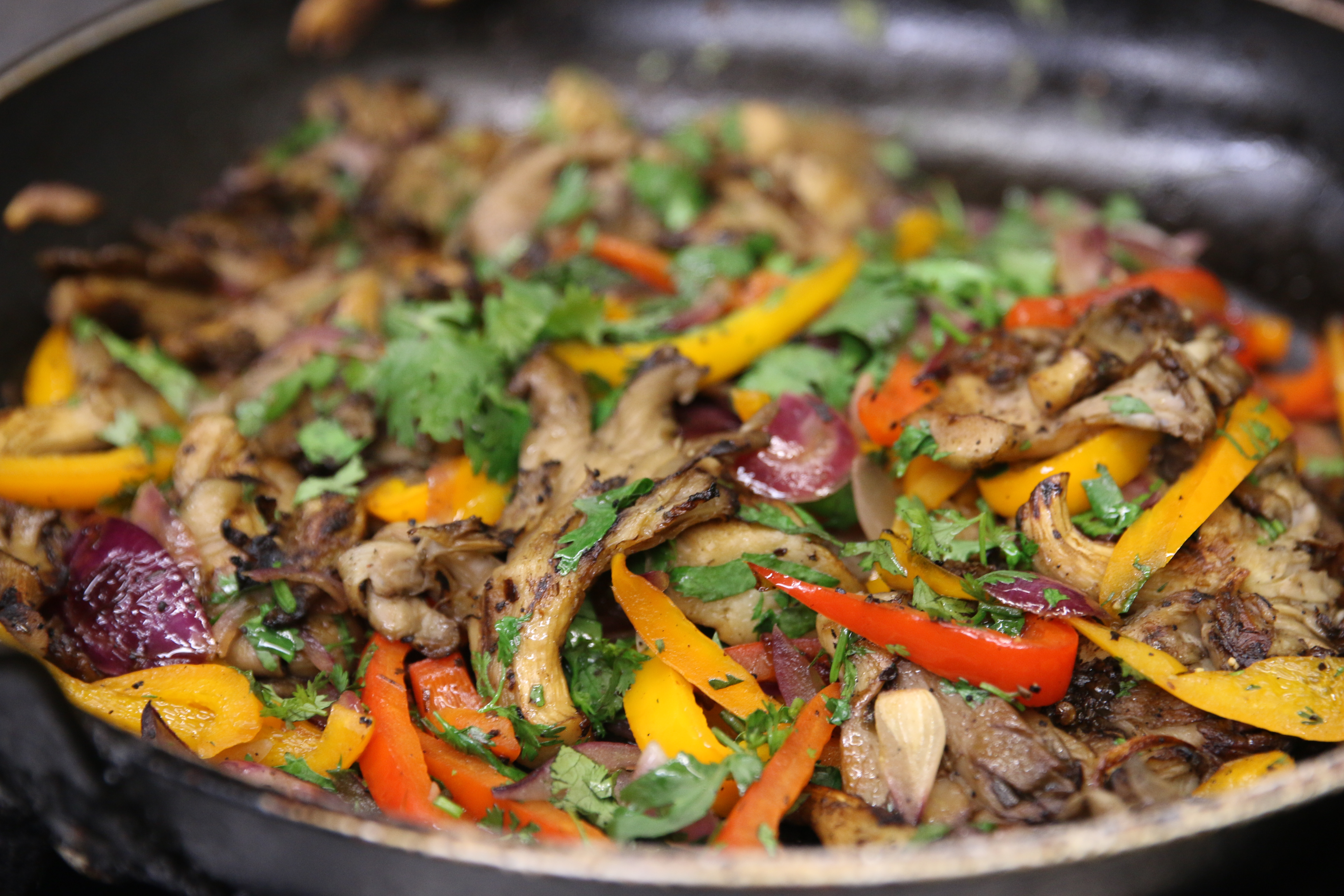
“You can use heart of palm, and it gives that salt fish look, and you can mix that in with the parsley and the peppers and the thyme and the ackee,” she explains. “If you want to make it taste more like salt fish, you can marinate it in nori sheets and soy, and let it sit in that and soak it up. And when you fry it, you’ve got ackee and saltfish!”
Back to the jerk mushrooms, and Fats looks satisfied with the adaptation. This is going better than expected.
Are people usually this receptive to Ama’s meat- and dairy-free dishes? “The initial reaction is uninterested,” she laughs, “and then they taste it and they’re like, ‘Woah, I didn’t know that was gonna taste so similar.’ A lot of the reactions I get are, ‘Oh, I don’t actually need the meat or fish,’ which is a good reaction.”
Ama and Fats serve the jerk mushrooms with the onions and peppers, as well as rice and peas, corn on the cob, and salad. It doesn’t quite match the visceral experience of using your hands to eat hot jerk meat off the bone, but the mushrooms are surprisingly meaty, and Fats’ sauce has a fresh, hot kick that gives the vegetable that iconic jerk tang.
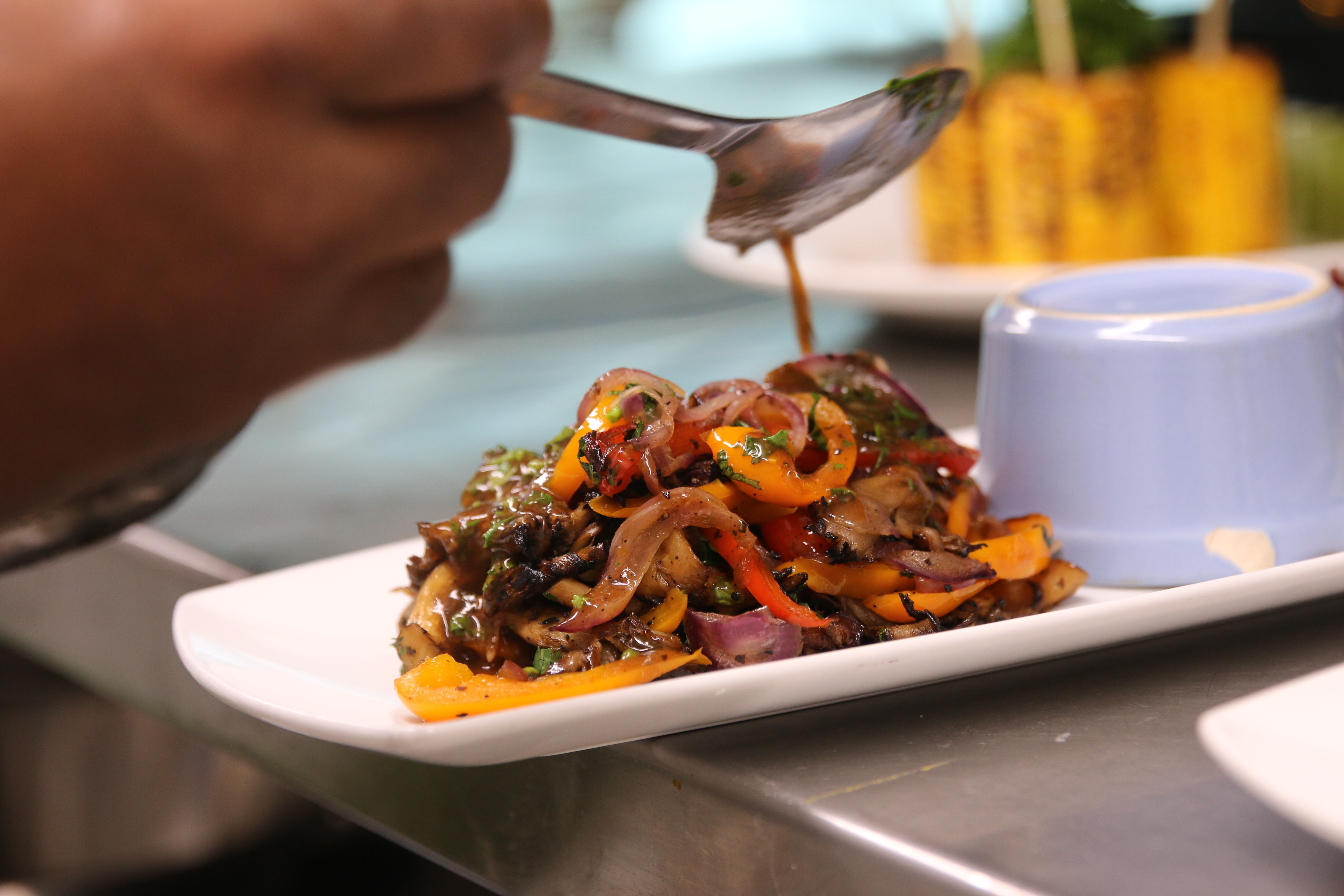
However, adapting traditional Caribbean dishes like jerk chicken—a recipe with roots in the escaped African slaves of Jamaica—can be a controversial subject. Indeed, this week Jamie Oliver was accused of cultural appropriation after releasing a microwavable “jerk rice” pouch, made with jalapeños, brown rice, and aubergine.
“I think if you visit these countries and you cook it authentically with the people of the country, and get inspiration from them,” says Ama, when subject turns to Oliver’s rice dish, “and it’s staying true to the culture, then, it is what it is.”
Fats doesn’t seem too threatened by the celebrity chef’s venture into Caribbean food: “Why not?” he asks. “If he sees a gap to make money, and other people are not doing it … ”
Jerk rice aside, I ask Fats what he’ll be cooking for the Mangrove float this year, which happens to be the biggest in the entire procession. He mentions some options—maybe wings, maybe fish, definitely plantain.
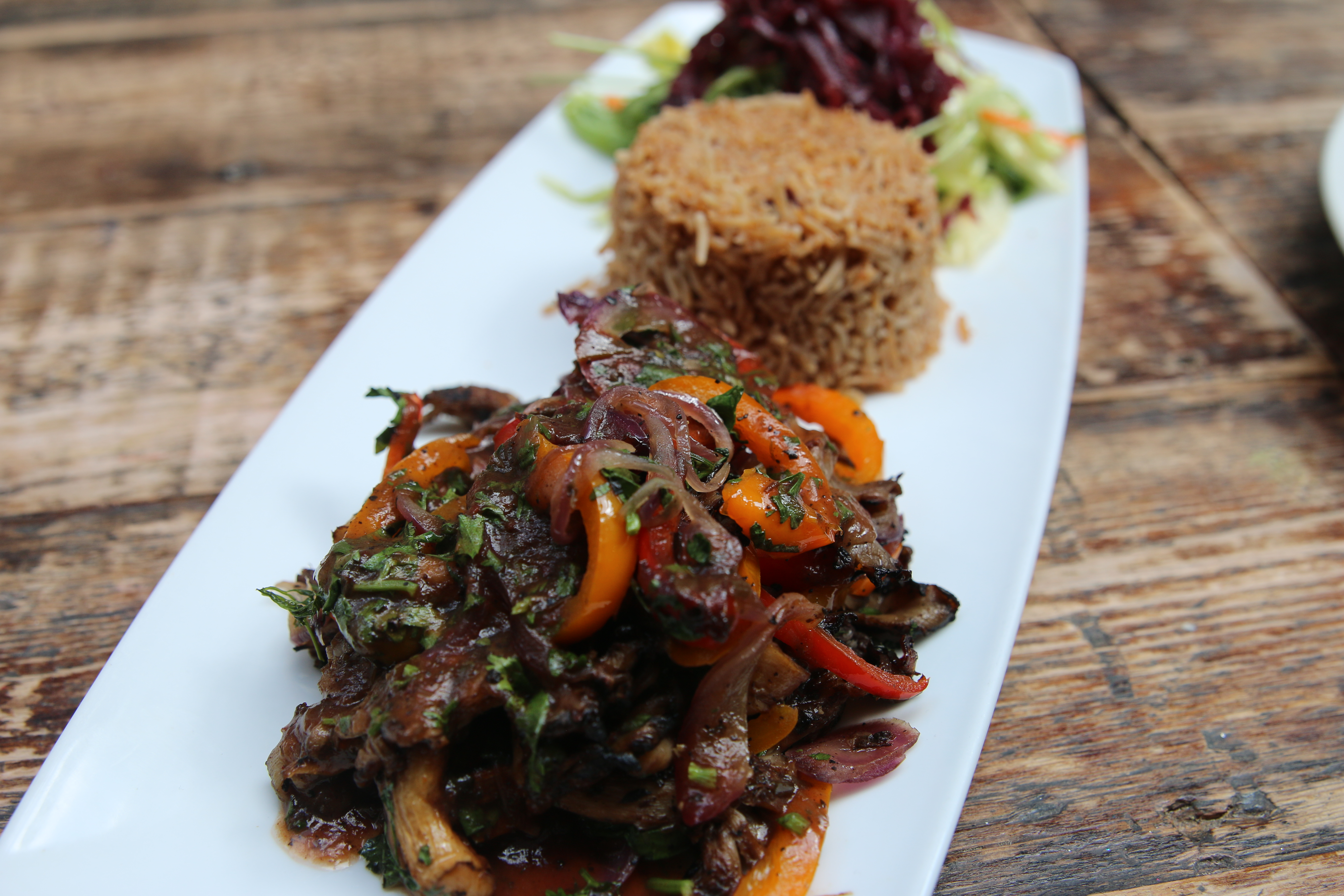
“You will make loads of vegans happy if you have something like this,” Ama says, gesturing to the mushrooms. “You’d get a queue of people.”
Fats seems to be considering it.
“I think there will be vegans at carnival,” she continues. “There is a whole movement where Rastafarians don’t eat meat.”
“You’ve given me an idea with this,” Fats says, taking another happy bite of the mushrooms.




